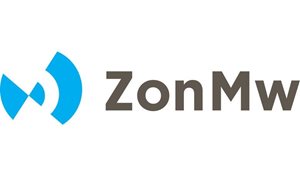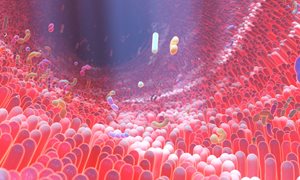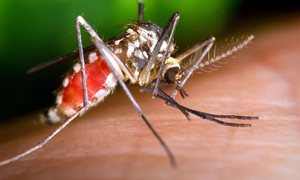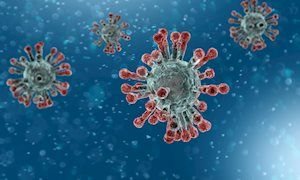17 February 2020
Benoit Besson, RIMLS - New strategies against virus transfer
The dengue virus causes widespread disease in tropical and subtropical areas. Due to global warming, the mosquito that spreads the virus, the tiger mosquito Aedus albopictus, may also become established in Europe.
Benoit Besson studies the mechanisms that the dengue virus uses to infect the mosquito. Which mosquito proteins does the virus hijack so it can reproduce? And how does the virus do that? Besson: “Our aim is to collect new information about the molecular activity of the dengue virus. We can then use this information to develop new strategies for combatting the spread of dengue, such as breeding dengue-resistant mosquitoes or preventing the mosquito from transmitting the virus.”
Annemarie Boleij, RIMLS - Can bacteria detect precursors of colon cancer?
Colon cancer and its precursors are usually detected with colonoscopy, using a camera in the intestine to look for tumors. However, many precursors are missed with standard colonoscopy, in part because some are flat in shape and therefore more difficult to see. It is precisely these flat tumors that can quickly develop into aggressive cancer. Better detection of these colon cancer precursors is therefore urgently needed.
In her research, Annemarie Boleij will investigate the bacterial biofilm on these precursors. The colon contains loads of bacteria. Her idea is that the composition of those bacteria – the bacterial biofilm – is partly related to the local situation in the colon. A slightly different biofilm forms on the precursor to colon tumor than in the rest of the colon. Boleij: “This difference in structure of the biofilm can perhaps be used for detection. We are going to map the composition of this biofilm at the protein level. In doing so, we will try to find proteins that are highly specific and characteristic for this biofilm, so that we can distinguish between healthy tissue and tumor tissue. We also want to develop substances to make that difference clearly visible, so that the technique can be used in the clinic.
Jonne Doorduin, DCMN - Unraveling neural control of breathing
Breathing happens without conscious control. It seems to be an automated process, but the way the brain controls breathing is actually very complex. We must inhale exactly enough oxygen and exhale the right amount of carbon dioxide, and this must also be coordinated with other activities such as talking and eating. A lot can go wrong in the control of breathing, as can be seen in hereditary myotonic dystrophy muscle disease. This disease also affects the brain, which causes breathing problems, among other symptoms. How this happens is still unclear. Jonne Doorduin intends to develop a new method to study the control of breathing in the brain with functional MRI. Doorduin: “With this new method, I want to unravel how the control of breathing malfunctions in patients with myotonic dystrophy. That information can be used to develop new therapies for these patients. In addition, the method can be used more broadly for research into respiratory problems in other diseases."
Jorik Nonnekes, DCMN - Does levodopa play a double role in frozen gait?
Frozen gait is one of the most debilitating symptoms in patients with Parkinson's disease. This is when the walking motion becomes blocked and patients appear to be ‘frozen’ in place. This phenomenon only occurs after patients have been ill for several years. “The drug levodopa may play a double role in this symptom,” says Jorik Nonnekes. “On the one hand, levodopa often alleviates frozen gait. On the other hand, the drug also seems to play a role in causing it. Recent research suggests that frozen gait is now more common than before the introduction of levodopa.” Nonnekes will investigate whether long-term use of levodopa actually contributes to the occurrence of frozen gait. To do so, he will compare data from Tanzania with data from the Netherlands. Nonnekes: “In Tanzania, patients often do not receive levodopa because it is unavailable or too expensive. If levodopa contributes to frozen gait, this symptom should occur less frequently in Tanzania than in the Netherlands.”
Sara Roig Merino, RIMLS - new treatment for hereditary kidneys cyst
In ADPKD – a genetic polycystic kidney disease – fluid-filled blisters known as cysts develop on the kidney, ultimately leading to chronic renal failure. As a result, patients need dialysis and sometimes even kidney transplantation. Current ADPKD treatments have many side effects. A potential new approach involves inhibiting a specific pathway in the kidney, the ATP signal route, which may reduce the development of cysts in the kidneys. However, so far this has not been investigated. Merino: “We want to identify agents that inhibit this important signaling route, but only for this specific condition. To accelerate this process, we will focus on agents that are already approved for clinical use or are being investigated in clinical trials (phase I-III). In this way, translation to treatment for these patients can take place as quickly as possible.”

Benoit Besson, RIMLS - New strategies against virus transfer
The dengue virus causes widespread disease in tropical and subtropical areas. Due to global warming, the mosquito that spreads the virus, the tiger mosquito Aedus albopictus, may also become established in Europe.
Benoit Besson studies the mechanisms that the dengue virus uses to infect the mosquito. Which mosquito proteins does the virus hijack so it can reproduce? And how does the virus do that? Besson: “Our aim is to collect new information about the molecular activity of the dengue virus. We can then use this information to develop new strategies for combatting the spread of dengue, such as breeding dengue-resistant mosquitoes or preventing the mosquito from transmitting the virus.”
Annemarie Boleij, RIMLS - Can bacteria detect precursors of colon cancer?
Colon cancer and its precursors are usually detected with colonoscopy, using a camera in the intestine to look for tumors. However, many precursors are missed with standard colonoscopy, in part because some are flat in shape and therefore more difficult to see. It is precisely these flat tumors that can quickly develop into aggressive cancer. Better detection of these colon cancer precursors is therefore urgently needed.
In her research, Annemarie Boleij will investigate the bacterial biofilm on these precursors. The colon contains loads of bacteria. Her idea is that the composition of those bacteria – the bacterial biofilm – is partly related to the local situation in the colon. A slightly different biofilm forms on the precursor to colon tumor than in the rest of the colon. Boleij: “This difference in structure of the biofilm can perhaps be used for detection. We are going to map the composition of this biofilm at the protein level. In doing so, we will try to find proteins that are highly specific and characteristic for this biofilm, so that we can distinguish between healthy tissue and tumor tissue. We also want to develop substances to make that difference clearly visible, so that the technique can be used in the clinic.
Jonne Doorduin, DCMN - Unraveling neural control of breathing
Breathing happens without conscious control. It seems to be an automated process, but the way the brain controls breathing is actually very complex. We must inhale exactly enough oxygen and exhale the right amount of carbon dioxide, and this must also be coordinated with other activities such as talking and eating. A lot can go wrong in the control of breathing, as can be seen in hereditary myotonic dystrophy muscle disease. This disease also affects the brain, which causes breathing problems, among other symptoms. How this happens is still unclear. Jonne Doorduin intends to develop a new method to study the control of breathing in the brain with functional MRI. Doorduin: “With this new method, I want to unravel how the control of breathing malfunctions in patients with myotonic dystrophy. That information can be used to develop new therapies for these patients. In addition, the method can be used more broadly for research into respiratory problems in other diseases."
Jorik Nonnekes, DCMN - Does levodopa play a double role in frozen gait?
Frozen gait is one of the most debilitating symptoms in patients with Parkinson's disease. This is when the walking motion becomes blocked and patients appear to be ‘frozen’ in place. This phenomenon only occurs after patients have been ill for several years. “The drug levodopa may play a double role in this symptom,” says Jorik Nonnekes. “On the one hand, levodopa often alleviates frozen gait. On the other hand, the drug also seems to play a role in causing it. Recent research suggests that frozen gait is now more common than before the introduction of levodopa.” Nonnekes will investigate whether long-term use of levodopa actually contributes to the occurrence of frozen gait. To do so, he will compare data from Tanzania with data from the Netherlands. Nonnekes: “In Tanzania, patients often do not receive levodopa because it is unavailable or too expensive. If levodopa contributes to frozen gait, this symptom should occur less frequently in Tanzania than in the Netherlands.”
Sara Roig Merino, RIMLS - new treatment for hereditary kidneys cyst
In ADPKD – a genetic polycystic kidney disease – fluid-filled blisters known as cysts develop on the kidney, ultimately leading to chronic renal failure. As a result, patients need dialysis and sometimes even kidney transplantation. Current ADPKD treatments have many side effects. A potential new approach involves inhibiting a specific pathway in the kidney, the ATP signal route, which may reduce the development of cysts in the kidneys. However, so far this has not been investigated. Merino: “We want to identify agents that inhibit this important signaling route, but only for this specific condition. To accelerate this process, we will focus on agents that are already approved for clinical use or are being investigated in clinical trials (phase I-III). In this way, translation to treatment for these patients can take place as quickly as possible.”
Related news items

Human microbiome could shed light on higher morbidity rate in minoritized populations The link between environmental inequities and disease may lie in the gut
15 June 2021 A study published in PNAS is the first to explicitly address the gut microbiome as a pathway to understanding how environmental inequities could lead to health disparities. go to page
First volunteers vaccinated with Radboudumc malaria vaccine
20 May 2021 Today a new vaccine against malaria, largely developed in Nijmegen, is being tested for the first time in volunteers at Radboudumc. go to page
Cooling strategies for COVID-19 health personnel to attentuate PPE-induced heat strain
11 June 2020 Radboudumc develops infographic with cooling information go to page
NWO Open Competition Domain Science - XS grant for Ronald van Rij and Jenny van der Wijst
21 January 2020NWO Domain Science has awarded Ronald van Rij, theme Infectious diseases and global health and Jennny van der Wijst, theme Renal disorders an XS grant. The XS category emphatically strives to encourage curiosity-driven and bold research involving a relatively quick analysis of a promising idea.
go to page
Towards molecular therapies for Myotonic Dystrophy
1 October 2019ReCognitION, a new 1.3 M€ European project under the leadership of Peter-Bram ‘t Hoen, Baziel van Engelen and Jeffrey Glennon, was kicked-off in Gent.
go to page
